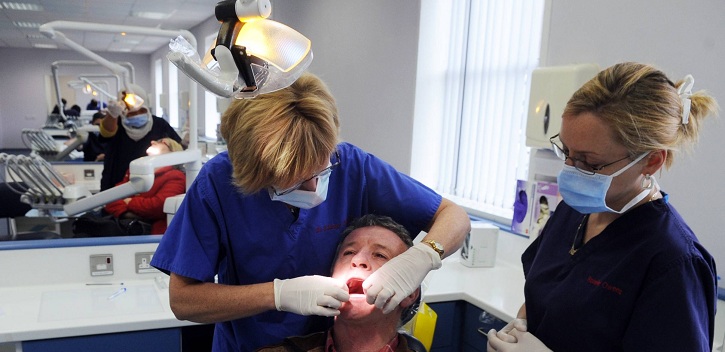2013 Press Releases
Mouth cancer awareness day has saved lives…

Cork University Dental School and Hospital is hosting a Mouth Cancer Awareness Day with free examinations next Wednesday, 18 September, 9am-4pm.
For the 4th year running, the Awareness day will involve free examinations and a wide range of information stands providing advice about Mouth, Head & Neck Cancer, smoking cessation, oral care and healthy diet. Those wishing to receive a free mouth cancer examination at Cork University Dental School and Hospital will be seen by appointment only. To arrange an appointment, call 021- 490 1169. This dedicated phone line is open from 10am-2pm until next Tuesday 17th September (excluding Saturday 14th and Sunday 15th).
Free mouth cancer examinations can also be obtained next Wednesday from any participating General Dental Practitioners – for list see www.mouthcancerawareness.ie. For those who cannot attend on the 18 September, this examination should be carried out by their dentists as part of the routine dental check-up.
There are more than 300 cases of cancer of the mouth (oral cavity and pharynx) reported in Ireland every year. These cancers are more common in men than in women. However this is changing. The incidence rate of cancer of the mouth in women has increased significantly at a rate of 3% per year since 1994. While it mainly affects older people, the number of younger people being diagnosed with this disease has increased steadily in recent years. In Britain, the incidence of mouth cancer has grown faster than any other cancer in the past 25 years.
While Mouth Head & Neck Cancer survival rates are excellent when diagnosed at an early stage, unfortunately many people present late. According to the National Cancer Registry in Ireland, roughly half of all mouth cancers and even less of cancers of the pharynx are diagnosed at an early stage. This can result in more complex treatment with greater impact on quality of life and overall survival. Mouth Cancer Awareness Day (MCAD) was established by Mouth Head & Neck Cancer Awareness Ireland to raise tackle the problem of late presentation by raising Public and Professional awareness of the warning signs of this disease, and the modifiable risk factors associated with it. It also aims to highlight the importance of having a mouth cancer examination every year, even if you have no remaining natural teeth.
“We are organising the awareness day,” says Dr Eleanor O’Sullivan, Cork University Dental School and Hospital and chair of the Mouth Head and Neck Cancer Awareness Ireland campaign “as mouth, head and neck cancer is on the increase in this country and yet it remains a relatively unknown disease.” It can affect the lips, gums, cheek, tongue, palate, tonsils, throat, salivary glands, sinuses, nose and larynx. Symptoms include ulcers that won’t heal, white, red or speckled patches, neck lumps or swellings and difficulty swallowing. “Many well- known people have suffered from this disease,” says Dr O'Sullivan. “Actor Michael Douglas had it and John Thaw who played Inspector Morse died of it. Ronnie Drew and Alex Higgins also died of the disease.”
How can I make sure that my mouth stays healthy?
- Visit a dentist regularly even if you wear dentures. This is especially important if you smoke and drink alcohol.
- When brushing your teeth, look out for any changes in your mouth or neck. Early warning signs include ulcers that do not heal within three weeks, red or white patches in the mouth, or other unusual changes in the mouth or neck.
- When exposed to the sun, make sure to use the correct type of barrier cream on your lips.
- Eat plenty of fresh fruit and vegetables. A good diet, rich in vitamins A, C and E, helps the body to protect itself from most cancers.
- Avoid the risk factors for mouth head and neck cancer.
These include:- Tobacco – cigarettes, roll-ups, cigars, pipes or cannabis, chewing tobacco, betel quid, gutkha and paan.
- Excessive alcohol consumption.
- Using both tobacco and alcohol together – this greatly increases your risk.
- Excessive exposure to sunlight or radiation (for lip cancer).
- A diet lacking in fruit and vegetables.
- Viral infections, e.g., human papillomavirus (HPV). HPV can be spread through oral sex.
